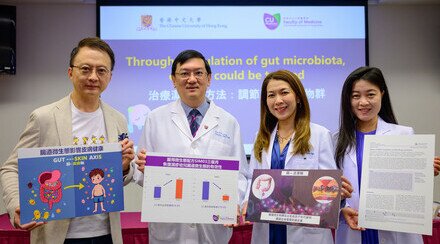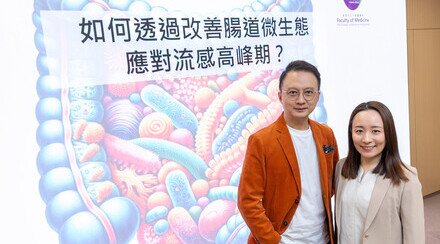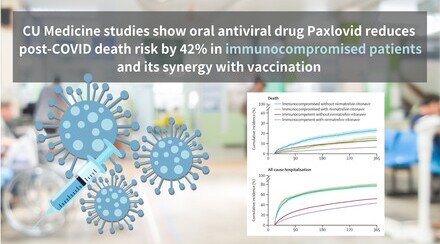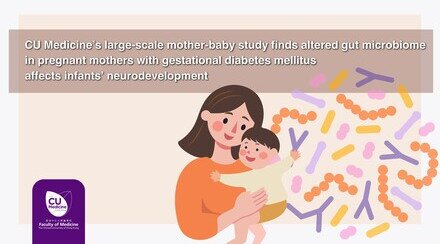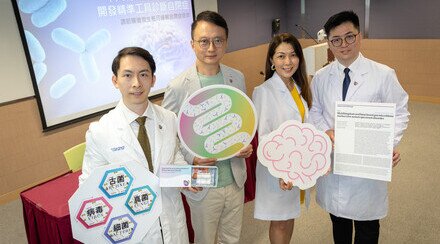Large-scale clinical study shows CU Medicine (SIM01) microbiome formula reduces risk of infections including COVID-19
A randomised, double-blind controlled study conducted by The Chinese University of Hong Kong (CUHK)’s Faculty of Medicine (CU Medicine) showed that SIM01, a CUHK-developed microbiome formula, successfully reduced adverse events in high-risk individuals such as elderly subjects and diabetics following COVID-19 vaccines. The research team also found that SIM01 lowered risk of bacterial and viral infections including COVID-19. Shotgun metagenomic sequencing of stool samples confirmed that SIM01 restored a healthy gut microbiota by increasing beneficial bacteria and reducing harmful bacteria in the gut.

A randomised, double-blind controlled study conducted by CU Medicine showed that SIM01, a CUHK-developed microbiome formula, lowered risk of bacterial and viral infections including COVID-19. The research team also found that SIM01 successfully reduced adverse events in high-risk individuals such as elderly subjects, young persons and diabetics following COVID-19 vaccines. Shotgun metagenomic sequencing of stool samples confirmed that SIM01 restored a healthy gut microbiota by increasing beneficial bacteria and reducing harmful bacteria in the gut.
(From left) Professor Francis Chan, Dean of CU Medicine and Director of the Centre for Gut Microbiota Research; Professor Zhang Lin, Assistant Professor at CU Medicine’s Department of Medicine and Therapeutics; Professor Siew Ng, Professor of CU Medicine’s Department of Medicine and Therapeutics and Director of Microbiota I-Center (MagIC); and Professor Martin Wong of The Jockey Club School of Public Health and Primary Care at CU Medicine.
SIM01 microbiome formula restores healthy gut microbiota
CU Medicine previously showed that gut dysbiosis was associated with severity of COVID-19 and its complications. SIM01 was effective in hasten recovery, enhance antibody response and reducing post-vaccination inflammatory markers. In the current study, 453 subjects who had received their first dose of COVID vaccine were recruited between 2021 and 2022 and randomly assigned to receive either SIM01 or a placebo containing vitamin C for three months (control group).

Professor Francis Chan states that the large-scale, double-blind clinical study conducted by CU Medicine is the first of its kind to combine clinical and laboratory analysis, further demonstrating Hong Kong's strong medical research capability to translate scientific findings into innovations that benefit the society.
“A rigorous, randomised, double-blind, placebo-controlled clinical trial and next generation shotgun sequencing technology were used to evaluate the effectiveness of the microbiome formula in restoring a healthy gut microbiota and boost immunity against bacterial and viral infections," said Professor Zhang Lin, Assistant Professor at CU Medicine’s Department of Medicine and Therapeutics.
SIM01 reduces adverse events of COVID vaccines and improves health quality
Adverse events one month after receiving the second dose of COVID vaccine was significantly lower in the SIM01 than control groups (2.9% vs 12.6%). Regardless of vaccine type, subjects who received SIM01 also had lower rates of adverse events at 3 months (0% vs. 3.1%), 6 months (6.2% vs. 16.9%) and 12 months (5.4% vs. 17.8%) than the control group. The study also found that the SIM01 group had better sleep quality (41.4% vs. 19.3%), more positive mood (21.1% vs. 11.4%) and improved skin quality (14.1% vs. 7.0%) than the control group.
SIM01 reduces the risk of COVID-19 and other infections
An important finding was that subjects receiving SIM01 had a significantly lower risk of new COVID-19 and other bacterial and viral infections (including dermatitis, sepsis, and wound infections) than the control group (Month 1: 0.5% vs. 5.6%; Month 3: 0% vs. 0.6%; Month 6: 4.8% vs. 15.5%; Month 12: 5.4% vs. 14.4%) suggesting that SIM01 can boost immunity against other infections.
Professor Martin Wong Chi-sang of The Jockey Club School of Public Health and Primary Care at CU Medicine, said, "Many elderly, paediatric and chronically ill patients remain worried about possible side effects of COVID vaccine. How to effectively boost immunity in these high-risk groups against various infectious diseases during the pandemic is also a major public concern. This large clinical study has supported the effectiveness of SIM01 in reducing the risk of COVID-19 and other bacterial and viral infections.”

Professor Siew Ng explains that a healthy gut microbiota has been associated with lower levels of inflammatory cytokines in the body and reduced risk of adverse events after vaccination.
Restore a healthy gut microbiota to combat infection
The research team used next generation shotgun metagenomic sequencing to analyse stool samples from 258 people in the clinical study. The results showed a significant increase in many good bacteria and a decrease in several harmful bacteria in the gut after SIM01 suggesting that SIM01 can restore a healthy gut microbiota.
“A healthy gut microbiota has been associated with lower levels of inflammatory cytokines in the body and reduced risk of adverse events after vaccination," explained Professor Siew Ng, Professor of CU Medicine’s Department of Medicine and Therapeutics and Director of Microbiota I-Center (MagIC). “We have demonstrated for the first time that SIM01 can restore gut microbiota to boost immunity which is particularly important for children, elderly subjects and those with chronic illnesses.
Professor Francis K.L. Chan, Dean of CU Medicine and Director of the Centre for Gut Microbiota Research, concluded, "This large-scale, double-blind clinical study is the first of its kind to combine clinical and laboratory analysis, further demonstrating Hong Kong's strong medical research capability to translate scientific findings into innovations that benefit the society. I hope the HK government will continue to provide resources and support to transform Hong Kong as a world-leading medical and innovation hub.”
This study was supported by the Health Bureau’s Health and Medical Research Fund (HMRF).










